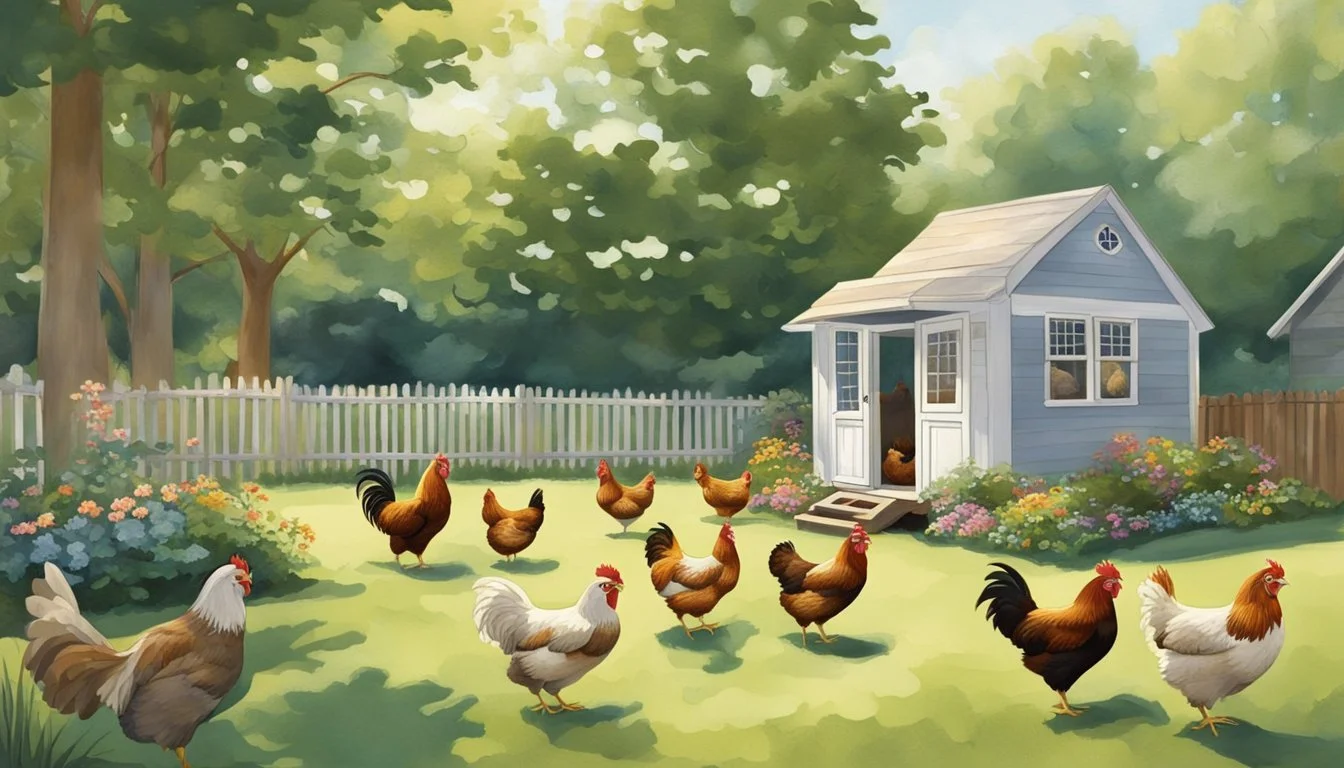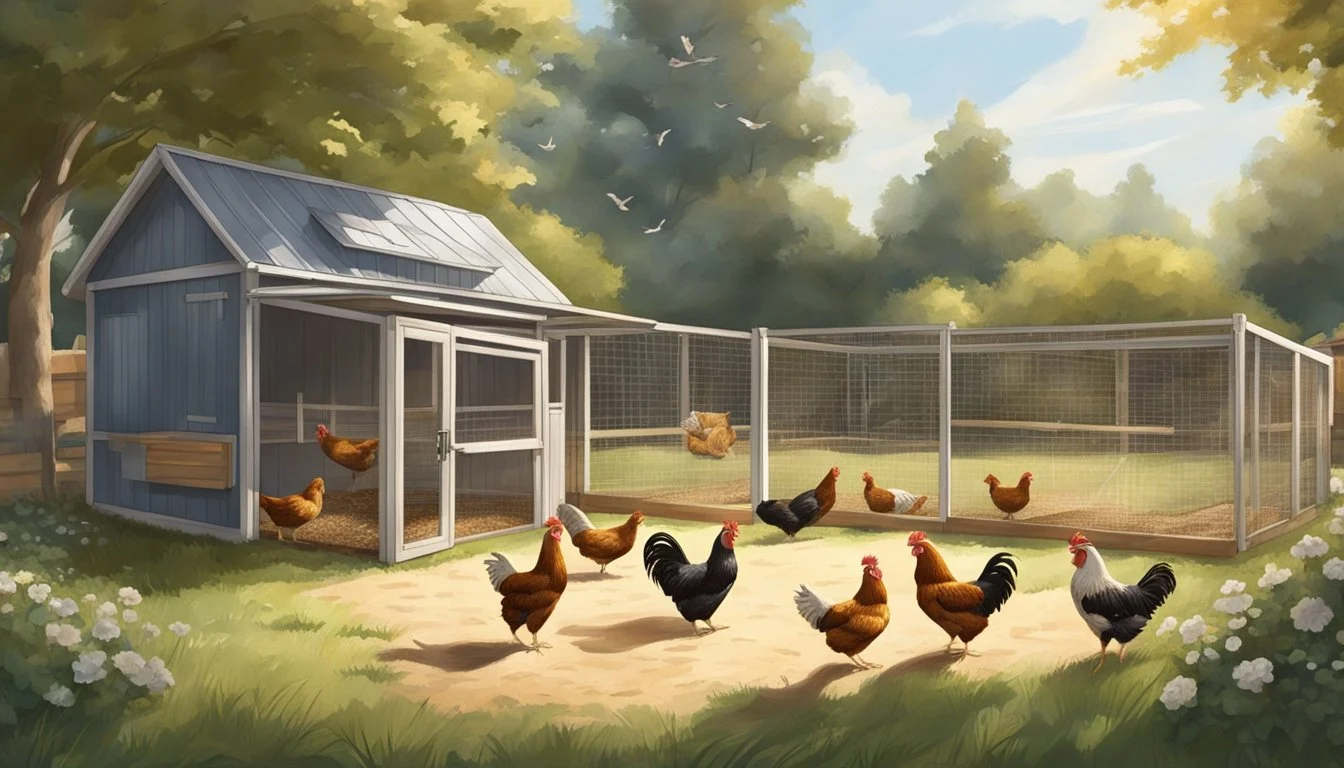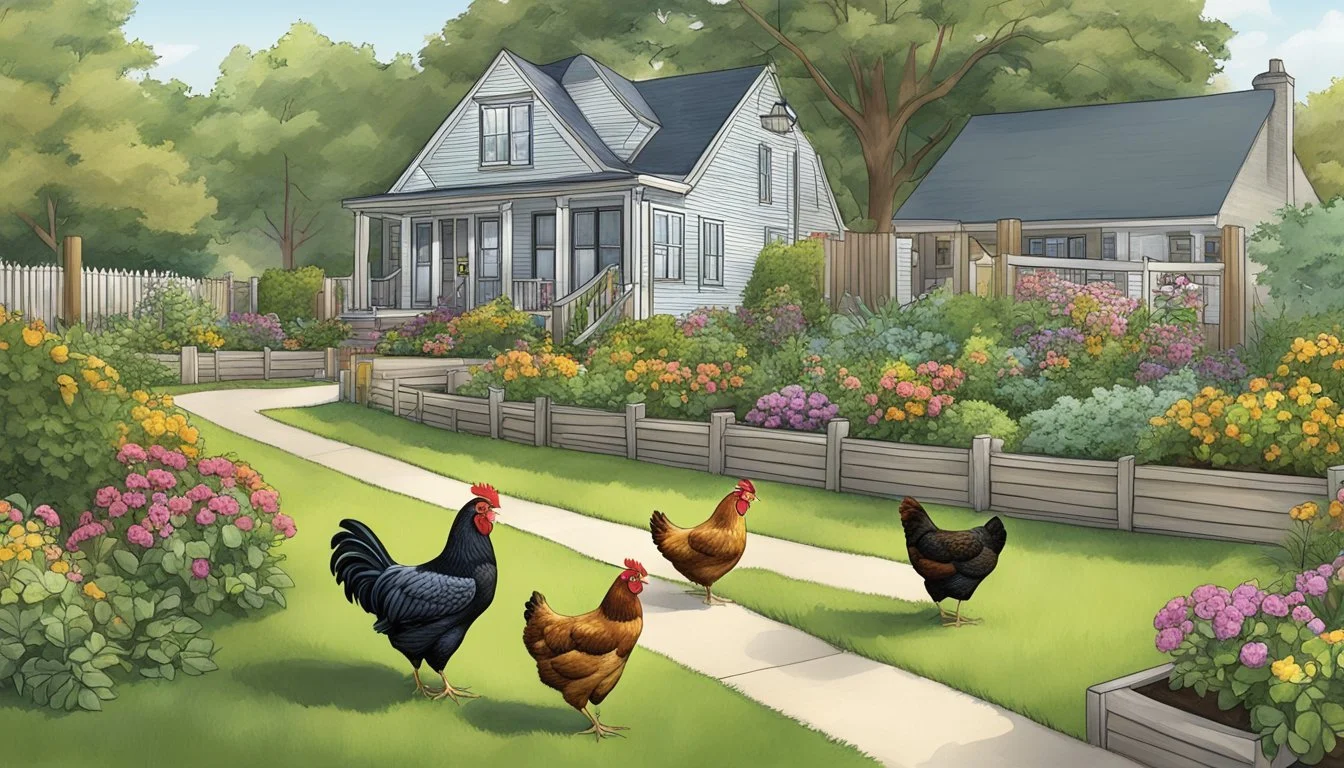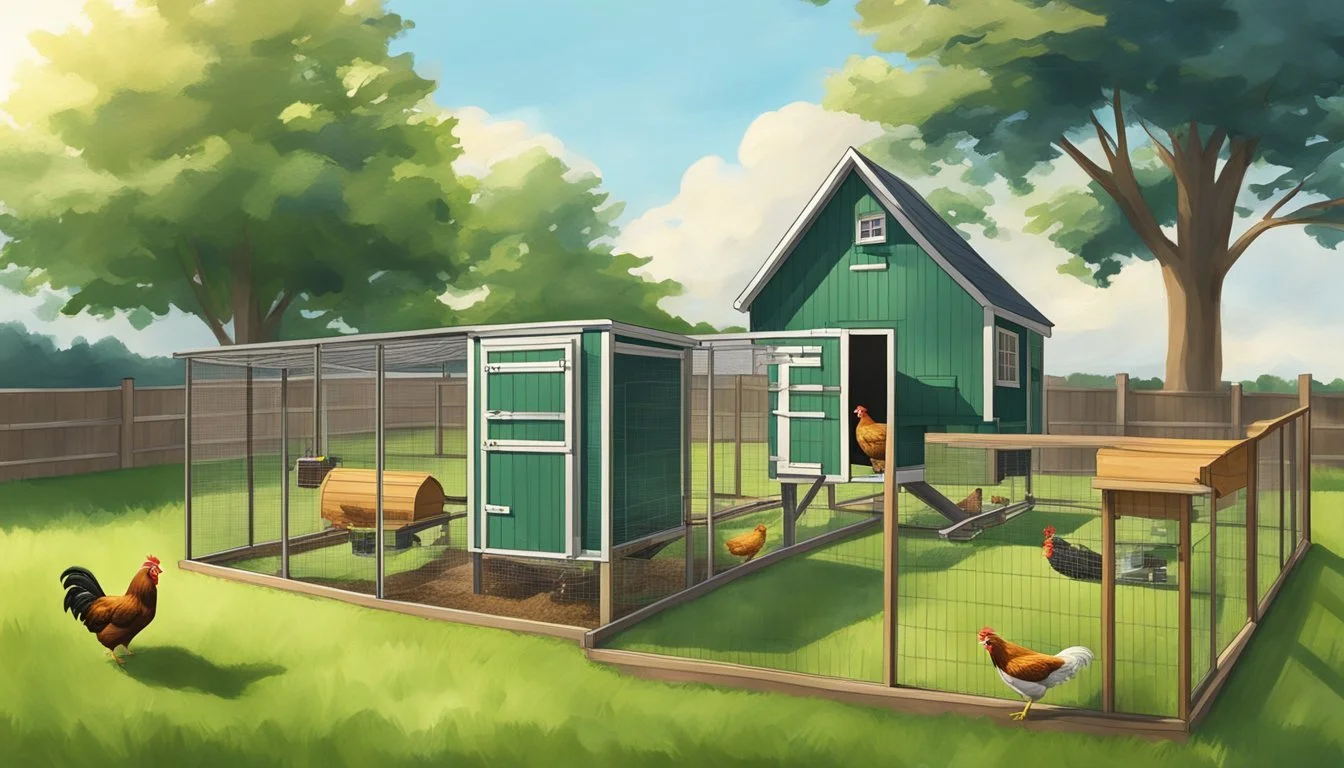Keeping Backyard Chickens in Hampton, VA
Essential Tips for Urban Poultry Farming
Backyard chicken keeping has become increasingly popular in many urban and suburban areas, and Hampton, VA is no exception. Residents of Hampton have embraced the practice, encouraged by the sustainable living trend and the desire for fresh, locally sourced eggs. In Hampton, the local ordinances have outlined specific guidelines to ensure that the keeping of backyard chickens is both respectful to neighbors and safe for the animals. These rules are in place to balance the interests of the community and the welfare of the chickens.
According to Hampton's regulations, residents may keep chickens for domestic purposes, but commercial activities, such as selling eggs or meat, are not permitted. The city also stipulates that chickens must have access to predator-proof housing which provides adequate ventilation, sunlight, and protection from harsh weather conditions. The chicken coops must be designed for easy access and cleaning, which underscores the importance of maintaining a healthy environment for the chickens while minimizing any potential nuisance or health issues.
While Hampton's approach to backyard chickens is supportive, they require prospective chicken keepers to stay informed and comply with local ordinances. For those interested in raising chickens, it's essential to be knowledgeable about the specific care needs of poultry and the local laws that govern their keeping. This ensures that both chicken owners and their neighbors enjoy the benefits of this practice without any adverse effects on the local community.
Understanding Local Ordinances and Regulations
When considering the possibility of keeping backyard chickens in Hampton, VA, residents must navigate a variety of city ordinances and state regulations. It is vital to understand the specific laws, zoning requirements, and permit application processes to comply with local governance and maintain allowable poultry practices.
City of Hampton Chicken Laws
In the City of Hampton, local laws permit the keeping of domestic chickens under certain conditions. The key ordinance specifies the maximum number of chickens allowed, which is up to six (6) hens, explicitly excluding roosters to minimize noise concerns. The Hampton City Code enforces these regulations to balance the interests of urban farming advocates and residents.
Permit and Application Requirements
For residents to lawfully raise chickens, obtaining a permit is mandatory. The process includes demonstrating compliance with city ordinances by:
Filling out an application form
Paying a non-refundable fee of $25.00
These steps are crucial in ensuring that all chicken owners in the city adhere to standardized guidelines and responsibilities.
Zoning and Property Line Restrictions
Zoning regulations also play a critical role in dictating the precise locations where chickens can be housed. The city's previous stipulation that chickens be kept at least 175 feet away from any neighbor's house has been modified to allow chickens on lots with single-family residences. However, this is still subject to restrictions concerning property lines and zoning codes, which must be thoroughly checked by prospective chicken owners to ensure they are in a suitable area as dictated by the Hampton City Council.
Setting Up Your Backyard for Chickens
Setting up a backyard in Hampton, VA, for chickens involves creating a secure, clean environment that meets both the chickens' needs and local regulations. Ensuring that the chicken coop provides shelter and the area is well-maintained for health are crucial steps in this process.
Choosing the Right Chicken Coop
When selecting a chicken coop, homeowners must ensure it is predator-proof, well-ventilated, and provides adequate sun and shade. The coop must be covered and designed to allow easy access for cleaning. According to local ordinances, coops should not be placed in front or side yards and must be at an adequate distance from neighboring properties, with considerations generally requiring a 25-foot setback.
Maintaining Cleanliness and Health
For the flock to remain healthy, maintaining cleanliness is vital. A clean chicken coop prevents the spread of diseases and deters pests. Regular removal of waste, cleaning of water containers, and changing of bedding are important routines. Ventilation is crucial to prevent dampness and to manage odors, so coops must have adequate airflow without creating drafts in colder temperatures.
Water and Feed Management
Chickens require constant access to clean water and a balanced diet. Waterers should be refilled daily with fresh water. Feeders need to be kept clean and filled with the appropriate chicken feed to meet the nutritional needs of the flock. It's recommended to place waterers and feeders in locations that minimize spillage and contamination.
Raising Chickens in Hampton
Raising chickens in Hampton, VA requires understanding local ordinances and providing proper care to ensure the health and productivity of backyard flocks. Local regulations permit up to four hens, with specified conditions on pen placement and permits.
Chicken Breeds and Choosing Livestock
When selecting chickens for a Hampton backyard, it is important to consider climate-hardy breeds. Popular choices include the Rhode Island Red and Plymouth Rock, both known for their robustness and consistent egg laying. One can procure chicks from local hatcheries, ensuring a healthy start to their livestock.
The Role of Roosters in Backyard Flocks
While hens are permitted within Hampton city limits, the keeping of roosters is often restricted due to noise concerns. Roosters play a crucial role in flock dynamics and breeding, but in urban settings, farmers must balance these benefits with the potential for noise disruption to neighbors.
Health and Nutrition for Optimal Egg Production
Achieving optimal egg production hinges on maintaining chicken health through balanced nutrition and regular veterinary care. A diet of high-quality chicken feed supplemented with grains, calcium, and greens supports laying hens. Preventative care against disease and predators also contributes to flock well-being.
Winter Care for Backyard Chickens
Chickens require extra care during winter. Livestock owners should ensure coops are well-insulated but ventilated, avoiding drafts. A consistent supply of fresh water that does not freeze is vital, as is maintaining access to a high-energy diet to combat the cold.
Community and Legal Considerations
When keeping backyard chickens in Hampton, VA, residents must navigate a series of legal requirements and community dynamics. The City of Hampton imposes specific ordinances that regulate chicken-keeping activities, reflecting the necessity for maintaining community standards and ensuring the welfare of the animals.
Petitioning for Ordinance Amendments
Residents who seek to amend the local chicken ordinances may submit a petition. The petition process typically involves gathering a significant number of signatures from the community to demonstrate support. A successful petition must clearly articulate the proposed changes and address their potential impact on the county and residential areas. The city may then review the petition and decide whether to initiate an amendment process.
Handling Complaints and Disputes
In cases where neighbors raise concerns or disputes arise over backyard chickens, a resolution process is essential. The city expects chicken keepers to maintain their coops at least 25 feet away from any neighboring dwellings, which minimizes nuisances. Neighborhood associations or local mediators may be involved to resolve disputes, emphasizing the importance of respectful engagement within the community.
Slaughter Regulations and Meat Production
Regulations on the slaughter and meat production of chickens are put in place to ensure humane treatment and public health. The City of Hampton permits the keeping of up to 6 hens but may have restrictions on slaughter within residential areas. Individuals considering the slaughter of chickens for meat must verify local county and city regulations to ensure they are in compliance and are not subject to application fees or penalties. The limitation on the number of hens and the prohibition of roosters serve to limit the scale of meat production in residential areas to personal use.
Comparison with Neighboring Areas
The regulations surrounding the ownership of backyard chickens in Hampton, Virginia, provide a context for understanding local ordinances. Neighboring cities and the broader state view contribute notably diverse perspectives on urban chicken farming.
Norfolk and Chesapeake Regulations
Norfolk: The city of Norfolk allows residents to keep backyard chickens; however, there are specific guidelines and permit requirements in place to regulate this practice. These guidelines include limits on the number of chickens and coop specifications.
Chesapeake: Similarly to Hampton, Chesapeake has its own set of rules regarding the keeping of chickens. These localized ordinances allow for the ownership of backyard chickens as long as residents adhere to certain conditions and possibly permitting processes which maintain neighborhood harmony and animal welfare.
Virginia Beach and Newport News Laws
Virginia Beach: Backyard chicken keeping in Virginia Beach is quite restrictive, allowing chickens primarily in agriculturally zoned areas. For those living in residentially zoned districts, owning chickens is generally not permitted, emphasizing the separation between urban living and agricultural practices.
Newport News: Like its regional neighbors, Newport News enforces its own chicken-related ordinances. While specific details on the number of chickens or the permitting process are unique to the city, the local government provides resources to ensure residents comply with these laws.
Broader Virginia State Chicken Ordinances
Across the Virginia state, each city maintains the right to govern backyard chicken ownership through individualized ordinances. There isn't a one-size-fits-all state law regarding backyard chickens; instead, the state allows localities like Richmond, Roanoke, Suffolk, and Alexandria to create and enforce their own regulations. Urban areas tend to have more stringent rules, while rural communities may offer more leniency, reflecting the balance between residential concerns and agricultural interests.
Resources and Further Reading
Access to the right resources is essential for anyone considering or currently keeping backyard chickens in Hampton, VA. This section provides a curated list of resources for supplies, community support, and educational material to ensure successful chicken keeping.
Local Farm Supply Stores and Hatcheries
For obtaining chickens, feed, and supplies, enthusiasts can rely on local farm supply stores and hatcheries. These establishments are invaluable for they offer a range of products from feeders and waterers to coops and bedding, as well as live chicks and chickens.
Store/Hatchery List:
Farm Supply Store A: Selling high-quality feed and poultry supplies.
Hatchery B: Offering a variety of chicken breeds suitable for backyard flocks.
Online Forums and Local Chicken Keeping Communities
Online forums and local chicken keeping communities provide platforms for discussions, advice, and sharing experiences. They are terrific places for new and seasoned chicken keepers to learn and connect.
Notable Online Resources:
ChickenLaws.com: Updates on local ordinances and regulations.
BackYard Chickens Forum: A forum for chicken keepers to discuss various topics related to chicken care.
Books and Guides on Chicken Care
For thorough knowledge on chicken care, there are various books and guides available. The American Poultry Association and other reputable authors offer comprehensive information on the subject.
Recommended Reading:
"The Chicken Health Handbook" by Gail Damerow: Covers health and disease management in detail.
"Storey's Guide to Raising Chickens" by Christine Heinrichs: A practical guide for keeping chickens in backyards.







